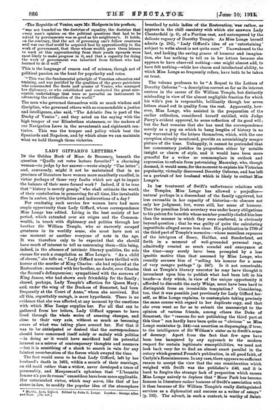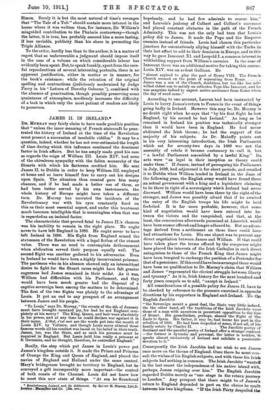LADY GIFFARD'S LETTERS.*
Iie the Golden- Book of Mine: de Tleatteacq, beneath the-- question eat votre lecture favorite?" a eharming- woman—.,to. judge by lieranswer—wrote-simply "Une letire"; and, conversely; might it not be- maintained that in no province of literature have women more manifestly excelled, in virtue Perhaps of those- very faults which are apt to impair -the balance of their more formal work ? Indeed, if it be true that "history is-merely gossip," who shall estimate the worth of their contribution in-preserving-for all time, like invaluable flies in amber, the trivialities' and indiscretions of a day?
For rendeyhig such service. few women have had- more- -ample opportunity than, Lady Giffird, whose correspondence" Miss Longe- has' edited. Living in the best society of her period, which extended over sir reigns and the Common- wealth; in touch with dipidmacy and polities through her brother Sir William Temple, who' so narrowly escaped greatness hr its worldly sense, she must have met at one moment Or another everyone- of note- in the age. It was therefore only to be expected that she should' have-much of interest to tell us concerning them—this being,. iiideed; in- the absence of intrinsic literary qualities, the sole excuse fbr such a compilation as Miss Longe's. "As a child of eleven," she tells us, "Lady Giffird must have thrilled with horror at the murder of Ring Charles: she had rejoiced at the Restoration mourned- with her brother, to doubt; over Charlei the Second's dellmmenties; ' sympathised with the sorrows' of :King James, who had shown such- friendship' for the family ; flared; perhaps. Lady Temple's ' affection for Queen Mary ; gird, ttri6r the wing of the Duchess of Elentereet, had been frequently at the Court of Anne," whom she survived. But all this; regrettablY-enough, is mere hypothesis. There fit no evidence that she was affected at any moment by the emotions with which Miss. Lenge- supplies her. FOr OR that can be isathered from her letters,. Lady Giffard appears- to have lived- through the whole series- of amazing changes, and close- to .: their *toy axis; without- so much at becoming aware of what- was'. taking place around her. Not that it was tO be, iiittittlimted or desired that -the correspondence- should have,coneerneci itself solely or mainly- with panties-
doing **it would. have sacrificed half its- potential interest as-a-mirror of 'contemporary thoughts and manners —but it is seinething of a- shook to search in- vain- for any faintest reverberation' of. the fOroes which swayed the time.
The fact would -seenr to be that Lady Gifford, left by her husband's death in 1681, within a month of their marriage; an old maid rather than a widow, never developed a trace of personality, and Manpassant's aphorism that " L'hotinte femme n'a pas-de roman" canseldom have heenmore applicable. Her untarnished virtue; which may serve, like that of her sister-in=law, to-modify the popular idea- of the atmosphere • Martha, Lady idifard, Edited by Julia G. Lange. London: George Allen end Bona. Ll5s, nat.] ' breathed by noble ladies- of the Restoration; 'was rather, as appears in the chill casuistry' with which she answers Lady Chesterfield (p. 6), of a Puritan cast, and untempered by the delicate roguery of Dorothy Temple. As Miss- Longe herself admits (p. 282), "Lady Giffard's idea of an 'entertaining' subject to write about is not quite ours."- Unawakened to the last, and leaking the saving graces of humour and imagina- tion, she has nothing to tell us in her letters because she appears to have observed nothing—one might almost add, to have felt nothing—while her charm-and intellectual-ability, to which Miss Long? so frequently refers, have both to be taken on trust.
The volume professes to be "A Sequel to the Letters of Dorothy Osborne "—a description correct so far as its interest centres in the career of Sir William- Temple, but distinctly misleading in view of the almost negligible fraction for which his wife's pen is responsible, brilliantly though her seven letters stand out in quality from the rest. Apparently, how- ever, Miss Longe, who assisted in the preparation of the earlier collection, considered herself entitled, with Judge Parry's evident approval, to- some-reflection of its good will; but the fact remains that she has used the correspondence merely as a peg on avhich to hang lengths of history in no way warranted by the letters themselves, which, with the one exception already mentioned; provide an astonishingly meagre picture of the time. Unhappily, it cannot be pretended-that her commentary justifies its proportion either by notable insight or charm of style, and- it would have been more graceful for a writer so commonplace in outlook and expression- tO refrain-from patronising Macaulay, who. though doomed, it would seem, for themoment to expiate his Victorian popularity, virtually discovered Dorothy Osborne, and has left us a portrait of her husband'- which is likely te outlast Miss Longe's; In her treatment of Swift's unfortunate relations with the Temples, Miler Longe has allowed a- prejudice—. 'nature/ perhaps in a descendant of the family aggrieved, but less excusable in her capacity of historian—to obscure not only her judgment, but, worse still, her sense of humour. That the penniless Irish secretary vras under heavy obligations to his patron for benefits whose number possibly chafed him-less' than the manner in which they were conferred, is obviously beyond question ; that he was guilty of quite the calculating ingratitude alleged seems less clear. His publication-in1709 of the third-part of Temple's memoirs—whose merciless exposure of the intrigues of Essex, Halifax, and Sunderland, set forth itr a moment of well-grounded personal rage, admittedly created so. much scandal and annoyance at the time—may surely have been prompted by a 'less ignoble motive than- that- assumed by Miss Longe, who roundly accuses- him of "selling his honour for a mess of very meagre' pottage" (p. 247). Is it not conceivable that as Temple's literary executor he may have thought it incumbent upon him- to publish what had- been' left in. his handa—a, duty whieh; in-view of the- unique opportunity it afforded to diectedit the early Whigs, most have` been bard- to distinguish from an irresistible temptation.? Considering, too,- that-it wee possible just previously for Lady Giffiud her- self, as Miss Longe explains, to contemplate taking precisely the same count° with regard' to her duplicate copy, and that she. even: went so far as to submit the manuscript to the opinion of various friends, among others the Duke of Somerset, the' "reasons for not publishing the third part at this time" (Jan hardly have been-quite so "obvious-" as Miss Longs maintains' (p. 244)—an assertion as disparaging; if true, to the intelligence of Sir William's sister as. to Swift's sense of decency. Apart from the fact that few age, have been leas hampered by any apProach to the modern respect for certain legitimate susceptibilities, we- need not look back very far to find an- almost exaot parallel in the outcry which greeted Froude's publication, in all good faith, of Carlyle's Reminiscences. In any case, there appears no sufficient reason to accept the view that the one consideration which weighed with Swift was the publisher's £41:1, and' it is hard, to forgive the strange lack of proportion which causes Miss Longe naively to deplore that "Moor Park has become famous in literature rather became of Swift's association with it than because of Sir William Temple's really distinguished services as a diplomatist and success as a writer of esbays " (p. 182). The' adverb, in such a context, is worthy of Saint.
Simon. Surely it is but the most natural of time's revenges that "The Tale of a' Tub" should sustain more interest in the house where it was written than, for instance, Sir William's misguided contribution to the P.halaris controfersy—though the latter, it is true, has probably assured him a more lasting, if less enviable, publicity than his share in promoting the Triple Alliance.
To the critic, hardly less than to the author, it is a matter of regret that so unfavourable a judgment should impose itself in the case of a volume on which considerable labour has evidently been spent. But, to speak frankly, apart from the care- ful reproductions of severatinteresting portraits, there is no apparent justification, either in matter or in manner, for the book's existence : while the retention of the original spelling and contractions (judiciously modernised by Judge Parry in his "Letters of Dorothy Osborne "), combined with the absence of punctuation, though possibly preserving some quaintness of atmosphere, needlessly increases the difficulty ef a task in which only the most patient of readers are likely to persevere.











































 Previous page
Previous page